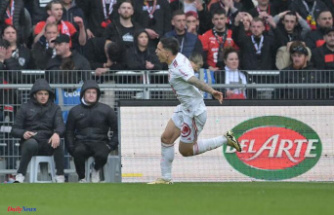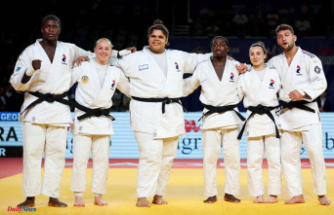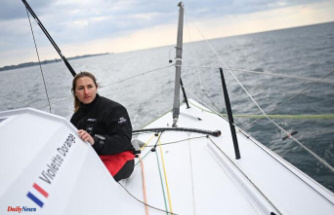Timo Boll is missing, Dimitrij Ovtcharov is missing, Patrick Franziska is missing: Despite this, a completely newly formed German team is now in the semi-finals of the Table Tennis World Championships. A man from the second row is in midfield and becomes a giant of mentality.
The supposedly second German table tennis series only knew such World Cup moments from the stands: Benedikt Duda stood at the table with his arms raised wide. And his two team-mates ran towards him from the bench, cheering. Even without the top players Timo Boll and Dimitrij Ovtcharov, the German national team has secured its place in the semi-finals at the World Team Championships in China and thus at least the bronze medal.
And just like the German women against Hong Kong the day before, she won her quarter-final against France 3-2 after being down 0-2. The semi-final opponent is South Korea on Saturday. "Germany should never be underestimated - it doesn't matter which team we come with," said individual European champion Dang Qiu. "In such a strong table tennis nation and with such a great table tennis history, you naturally have several good players. We got our chance here - and showed that we can do it too!"
The last time both German teams won a World Cup medal was in Moscow in 2010 and before that in Manchester in 1997. For the German women it was bronze in Chengdu, they lost their semi-final against Japan 0:3 on Friday.
The real surprise is that a team made up of Dang Qiu, Benedikt Duda and the only 19-year-old World Championship debutant Kay Stumper has come as far as record European champion Boll and Olympic bronze medalist Ovtcharov, both of whom missed out due to a lack of training , and Patrick Franziska, who has just become a father for the first time, otherwise reliably managed. "It's crazy that we already have a medal," said national coach Jörg Roßkopf. "South Korea are of course very difficult opponents, they play really well here."
The 19 and 16-year-old brothers Alexis and Felix Lebrun initially gave his team a hard time against France. Alexis beat Duda 3-2 after falling 0-2 sets down. After that, even European champion Dang had no chance against "the little one" (Roßkopf via Felix Lebrun). He lost 3-1. The turning point was initiated by the German top talent Stumper, who was still undefeated at his first World Cup, against Jules Rolland with a 3:1. After that, Dang and Duda also defeated the two Lebrun brothers - this time only in the opposite constellation.
"It's sport," said 28-year-old Duda. "It was a tough defeat at the start and I was angry with myself. But I knew: We'll come back and I'll get our fifth match. Nobody likes to play when the score is 2-2. But I knew: The momentum is on ours side, the French are a bit bruised. The ending was amazing."
The course of this World Cup reflects the development in international table tennis. Many teams are repositioning themselves for the 2024 Olympic Games in Paris. Especially in Europe, young players like Dang Qiu with his European title, the Swede Truls Möregardh with second place at the individual world championships or the Lebrun brothers cause a stir. Only the hosts and top favorites China still have the individual world champion Fan Zhendong and the individual Olympic champion Ma Long at the table.
Their German rivals Boll, Ovtcharov and Franziska flew to China on Thursday evening to collect world ranking points for the Olympic qualification at several WTT tournaments. They wouldn't have managed to play a World Cup before these tournaments. In return, they sent greetings to Duda, Dang and Co. on social networks. They could hardly have done better at this World Cup.












